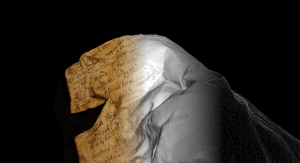QMUL Digital Humanities Lecture 2016
Beyond Digitisation: Reimagining the Image in Digital Humanities
Professor Melissa Terras (UCL)
Wednesday 16 November
6-7pm, followed by a wine reception.
David Sizer Lecture Theatre, Bancroft Building, Mile End Campus, QMUL.
Book tickets here.
The digitisation of primary source material is often held up as a means to open up collections, democratising their contents whilst improving access. Yet Digital Humanities has made little use of digitised image collections, beyond wishing to get access to individual items, or the text that can be generated via Optical Character Recognition or transcription of primary sources. Why is this, and what opportunities lie for image processing and computer graphics in the field of Digital Humanities? What barriers are in place that stop scholars being able to utilise and analyse images using advanced processing? Given the importance to text for Digital Humanities, how can we begin to reconceptualise what we can do with large bodies of digital images? In this lecture, Terras will showcase work from projects as diverse as the Great Parchment Book, Transcribe Bentham, and the Deep Imaging Mummy Cases projects, showcasing how those in the Digital Humanities can contribute to advanced cultural heritage imaging research.
Melissa Terras is Director of UCL Centre for Digital Humanities, Professor of Digital Humanities in UCL’s Department of Information Studies, and Vice Dean of Research in UCL’s Faculty of Arts and Humanities. With a background in Classical Art History, English Literature, and Computing Science, her doctorate (Engineering, University of Oxford) examined how to use advanced information engineering technologies to interpret and read Roman texts. Publications include Image to Interpretation: Intelligent Systems to Aid Historians in the Reading of the Vindolanda Texts (2006, Oxford University Press) and Digital Images for the Information Professional (2008, Ashgate) and she has co-edited various volumes such as Digital Humanities in Practice (Facet 2012) and Defining Digital Humanities: A Reader (Ashgate 2013). She is currently serving on the Board of Curators of the University of Oxford Libraries, and the Board of the National Library of Scotland, and is a Fellow of the Chartered Institute of Library and Information Professionals and Fellow of the British Computer Society. Her research focuses on the use of computational techniques to enable research in the arts and humanities that would otherwise be impossible. You can generally find her on twitter @melissaterras.
